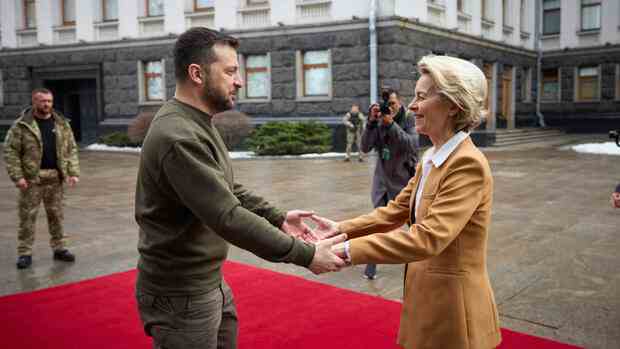Brussels EU Commission President Ursula von der Leyen traveled to the EU-Ukraine summit, which begins on Friday, with a clear commitment. Arriving in the Ukrainian capital on Thursday morning, for the fourth time since Russia’s war of aggression began, and this time accompanied by 15 of her commissioners, she announced: “We are here together to show that the EU is as strong as ever stands by Ukraine.”
A wartime and high-risk summit – that alone is a signal of how close relations between Kyiv and Brussels have become. But von der Leyen does not want to stop at symbolism. She brings concrete promises of help.
This includes support for the repair of the energy infrastructure, which is being systematically bombed by Russia. “We will ensure that electricity continues to flow through the grid despite the attacks,” von der Leyen promised. The EU will reserve 150 million euros for the purchase of energy technology. In total, the EU is providing Ukraine with 18 billion euros this year.
The EU training mission for the Ukrainian military is also to be expanded. The EU wants to train 15,000 more soldiers, bringing the total to 30,000.
In addition, von der Leyen announced that the tenth package of sanctions that has been planned since December should be ready by February 24 at the latest – on the first anniversary of the Russian invasion. New entry and asset bans are expected for those responsible in Russia and Belarus.
Zelenski expects “news” on the EU accession process
But the Ukrainian hosts are expecting more, so expectation management is particularly important at the summit. The government in Kyiv is pushing for a specific date for its EU accession. However, Brussels has not yet decided on a specific date.
High-ranking EU officials emphasize that the same applies as applies to all contributor candidates: First, all the criteria for accession must be met. Despite important reforms, this is not yet the case with the rule of law and the fight against corruption. Just recently, cases of corruption within the government shook the country, and several ministers and deputy ministers had to go.
Ukraine does not want to settle for an indefinite perspective. Before von der Leyen’s arrival, Ukrainian President Volodymyr Zelensky made it clear that his government was expecting “news”. “We expect decisions from our partners in the European Union that (…) correspond to our progress. Progress that is obviously there – and that despite the widespread war,” he emphasized, underlining his will to reform. His country should be ready to join in two years.
EU accession is also militarily significant for Ukraine. The European treaties provide for a mutual assistance clause. In the event of an “armed attack on the territory of a member state”, the other EU members are obliged to support the country attacked.
However, that is precisely the reason why rapid accession is out of the question for many EU countries. Not getting drawn into the war with Russia remains a foreign policy guideline, including for Germany. Ukraine has therefore already had a plan B drawn up.
Ukraine expects a clear prospect of accession, Zelensky made clear before the summit.
(Photo: AP)
Former NATO Secretary General Anders Fogh Rasmussen, together with Zelensky’s chief of staff Andriy Yermak, devised the “Kyiv Security Compact” – an arrangement that provides security guarantees for Ukraine in order to bridge the time until its accession to the EU and possibly also to NATO.
The plan was first announced in September 2022. It stipulates that a number of Western countries, including Germany, will undertake to strengthen Ukraine militarily and make it a “bulwark” against Russian attacks.
Rasmussen: Europe cannot wait for peace negotiations
Rasmussen has been promoting the initiative for weeks – with some success. On Thursday, the EU Parliament voted for a resolution that explicitly mentions the “Kyiv Security Compact”. MEPs called on EU member states to “work closely with Ukraine on security guarantees based on the Kyiv Security Pact”.
The ex-NATO Secretary General is promoting his plan to support Ukraine with far-reaching security guarantees.
(Photo: Reuters)
The resolution is not binding, but it does put “political pressure on governments”, as Rasmussen emphasized in an interview with the Handelsblatt and some other European media. He will travel to Berlin next week, and an appointment at the Chancellery is also planned.
Rasmussen said the Europeans should not wait for a ceasefire or even a peace agreement with Russia. “That would give the Kremlin an incentive to continue the aggression,” he warned. “To win a war you must surprise and overwhelm the enemy.”
In Brussels, however, it is just as unlikely that the Europeans will agree to the military pact with Kyiv as the announcement of a fixed date for Ukraine’s EU accession. And for the same reason: Europeans are concerned about being drawn into a direct confrontation with Russia.
More: The EU no longer wants to import diesel or heavy fuel oil from Russia
